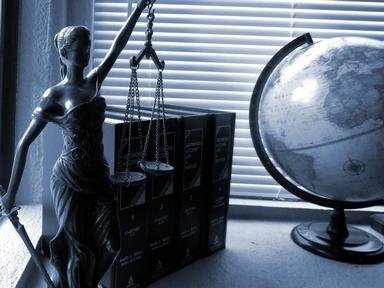Quiz Answer Key and Fun Facts
1. A Queen's Counsel is also known as which of the following nicknames?
2. Which of the following Founding Fathers was NOT a lawyer?
3. Which of the following is the term used in legal fields to indicate that a lawyer is representing a client for free?
4. When read literally and when using the intentions of the Founding Fathers, which of the US Constitutional Amendments specifically provides Americans the Right to Bear Arms for their own personal security?
5. What type of jurisdiction gives a Court the power to make decisions over a particular tangible object?
6. Out of the original 24 defendants at the Nuremberg Trials (1945-1946), which tried Nazi's for war crimes committed in World War II, how many were sentenced to death?
7. Another Founding Father Question. Which Founding Father defended the English soldiers who were indicted for the 'Boston Massacre'?
8. A person charged with a criminal offence in the United Kingdom has a right to silence, although their silence may be used against them in a Court of Law.
9. There are six specific crimes that have fixed penalties under fundamental traditional Shari'ah law (Islamic Law). One of these is an accusation of unchastity (which is not proven). What is the fixed punishment for the perpetration of this particular crime?
10. Which of the following means 'buyer beware'?
Source: Author
TemplarLLM
This quiz was reviewed by FunTrivia editor
gtho4 before going online.
Any errors found in FunTrivia content are routinely corrected through our feedback system.
